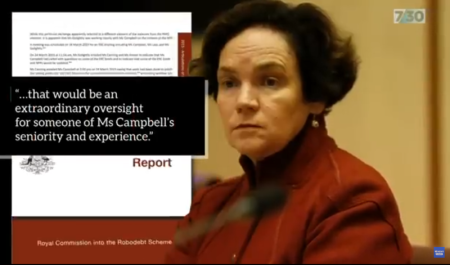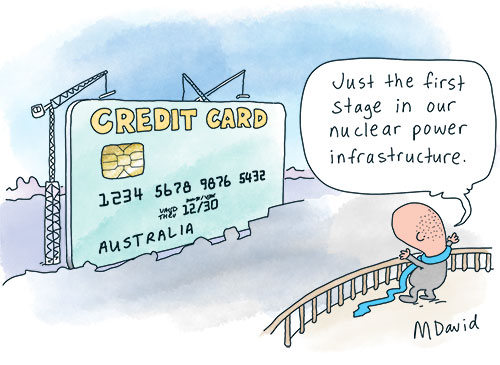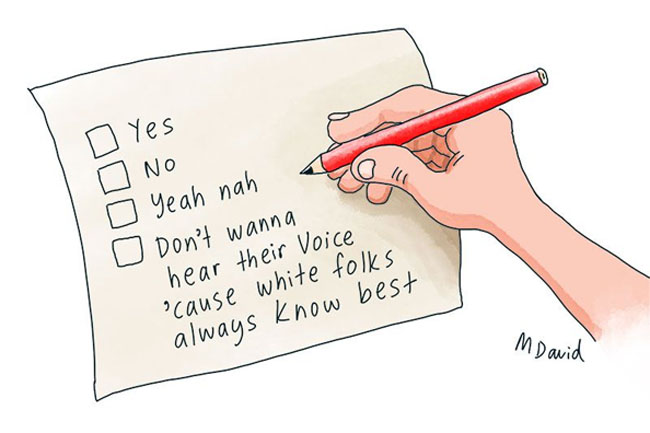Michael Galvin asks if the 2019 Election might have had a different result had Labor focused more effort on winning Tasmania.
THE FLIGHT TIME from Sydney to Launceston is one hour and 35 minutes. On the morning of the Election, Scott Morrison decided to spend over three hours of his day on an aeroplane. All so he could spend time striving to get some last minute votes in the Labor seat of Bass. He must have known that the seat was in play and worth the effort.
He must also have known, because anyone interested in politics would also know, that in Tasmania you are likely to get a good return on your campaigning investment. If you get one, you’ll probably get more than one. In this event, he got two: Bass and Braddon. Enough to seriously complicate any Labor path to victory in the event of a tight contest.
Meanwhile, Bill Shorten was in Melbourne taking one of his regular jogs. He was pictured in front of Flinders Street Station wearing a ‘Vote 1 Chloe Shorten's husband’ tee shirt.
For his fans, a nice gesture. For everyone else, a bit cute and self-indulgent. Especially when you consider his opponent’s wife — Jenny who? Writing this article, I had trouble remembering Morrison’s wife’s name, even though the article I read about her by Jordan Baker a week earlier was probably the best profile of a politician’s wife I have read in a long time. Her truth-telling about the crappiness of raising children when married to a politician was extraordinary in its frankness.
My point is this: If Morrison knew Tasmania was in play, then why didn’t Labor? If Morrison could bother with such an inconvenient trip on Election day, why didn’t Shorten? Shorten’s trip would have only taken him 30 minutes.
For the record, Morrison travelled to Tasmania seven times during the Election. Shorten, two times. Such a mismatch is almost inexplicable. Why did the Labor campaign team give up on Tasmania? Who was asleep at the wheel?
If Labor’s approach in Tasmania was a failure, then it gets worse in the Sunshine State.
If some Labor candidates were headed towards a ten per cent swing against them in Queensland, why didn’t the Labor Election machine know this and act accordingly? How could the candidates themselves not have felt this in the shopping malls? Why did Shorten cancel a full day of final campaigning in Queensland after the news that Bob Hawke had died?
It's easy to be wise after the event, but it seems that the ill-fated Labor team was living in a bubble of wishful thinking — of hope rather than reality.
Another aspect of this wishful thinking surrounded Bob Hawke’s passing. While some pundits thought this would be good for Labor, the opposite was probably true. In an instant, the visual comparison became apparent between Hawke and Shorten and it is fair to say who looked vastly the superior.
It is easy to see now that Hawke and Shorten’s approaches to winning elections were diametrically opposite. Read Hawke’s policy launch for the 1983 Election. It’s all about bringing people together, reconciliation and national unity. You will look in vain for anything like the Shorten/Bowen policies that take money away from some groups to give to others. Hawke kept himself a small target, policy-wise. He stressed values, not tax specifics, especially complex tax increases that most people would not understand and could easily be frightened into thinking applied to them.
"if policies aimed at soaking the well-off lost Labor the election, the voting patterns are curious; the targets of the alleged "class warfare" embraced their oppressors. "If Bill Shorten was running a class warhttps://t.co/Rej8gUW0gH
— Andy Gorfman (@AndyGorfman) May 24, 2019
Much has been written in recent days about the many achievements of the Hawke Government and rightly so. The interesting thing is that very few of these major achievements were spelt out in advance in the 1983 policy platform, with the exception of Medicare and even that was in general, platitudinous terms.
Hawke waited till he had won and had electoral muscle before doing most of his memorable things. Can you imagine him campaigning on a decision to float the dollar? Or the other major economic “reforms”? Or letting 20,000 Chinese students stay in Australia? The list goes on.
Sadly, Shorten’s greatest moment will probably be the 2016 Election, when he surprised everyone, including probably himself, by nearly defeating Turnbull. In some ways, perhaps Shorten thought he was fighting this election all over again, assuming the 2016 votes to Labor were locked in. They weren’t. Who knows how many of those unexpected Labor votes in 2016 were a vote against the idiocy of Abbott and the moral collapse (or arrogance) of Turnbull? With both of them out of the race and Morrison in their face, spruiking the mother of all scare campaigns 24/7, it was all going to be so much more complicated than 2016.
Reform is possible, but surely the lesson is: you’ve got to win power first. I hope there’s a bright young Queenslander waiting in the wings. Labor needs one badly.
Michael Galvin is an adjunct fellow at Victoria University and a former media and communications academic at the University of South Australia.My takeouts - about Australians, politics, the environment and the future. What do you think? #auspol
— Phil Stubbs (@PhilStubbs) May 19, 2019
'Australian election aftermath: what do we learn about politics and the future' https://t.co/W6DWPWaYv5
“Since the 1980s, Labor has only ever been elected on a ‘third way’ platform. To win in future, Labor needs to find out what that ‘way’ is in today’s Australia, and beat the Coalition at their own game.” - Sam Johnstonhttps://t.co/jmxsYgKrzz pic.twitter.com/Ea9ejjgFhQ
— McGill Journal of Political Studies - Online (@MJPSonline) May 22, 2019
 This work is licensed under a Creative Commons Attribution-NonCommercial-NoDerivs 3.0 Australia License
This work is licensed under a Creative Commons Attribution-NonCommercial-NoDerivs 3.0 Australia License
Support independent journalism Subscribe to IA.












